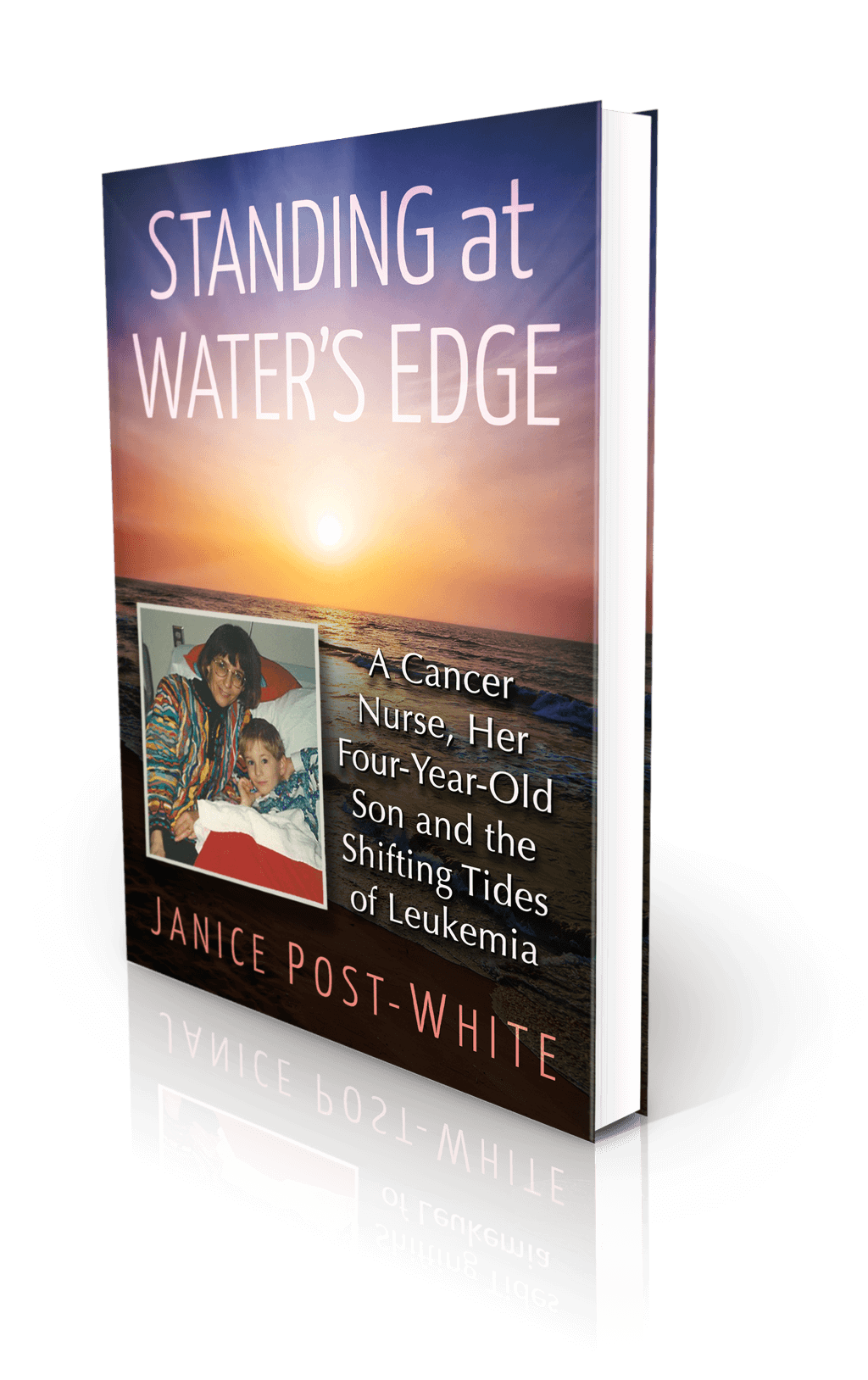
I try not to have expectations for the book’s success, but authors write to be read. I have learned, however, to let go of outcomes I can’t control. Letting go of expectations allows us to be present in the moment.
Friends ask me how my book, Standing at Water’s Edge, is selling now that it has been out in the world for a few months. “I don’t really know,” I say. And it’s true. From what I understand, publishers share sales data (through royalty checks) once or twice a year. Amazon shares ranking data, but you can’t put a number on that. I have a paid subscription to NPD BookScan through Publishers Marketplace, so I can get a rough estimate of print copies sold, but it’s reportedly not all-inclusive and (mostly) doesn’t include eBook sales. And, well, maybe I don’t really want to know. After all, it’s early, and it’s a niche market book that won’t appeal to everyone, although readers have told me they can relate to the situations and decisions as a parent of young children or teens, a son or daughter caring for a parent, a person with cancer, or as a healthcare professional. And everyone can relate in some way to facing their fears (whatever they are) and finding the strength and courage to get through adversity.
I try not to have expectations for the book’s success, but authors write to be read. And it’s my responsibility (and the publisher’s expectations) to get the book seen and found (through marketing and publicity).
One of the themes in my memoir is to let go of expectations—our own expectations for ourselves and others’ expectations for us. When my son was diagnosed with leukemia, I expected that I would know the treatment options, side effects, and how to navigate the healthcare system. I was a cancer nurse, after all. But I had no training as a cancer mom. I felt responsible to advocate for my son and guide my family through three years of treatment, yet I felt vulnerable like every other parent who fears losing their child. I expected myself to handle it all – somehow.
Others, too, had expectations for me in my roles as mother, daughter, caregiver, and cancer nurse/teacher/researcher. I struggled to balance and carry out my roles, much less do them to my satisfaction, which reflected my own expectations for myself. It seemed easier to let go of what other people expected of me than to release what I expected of myself. But then, I’ve never been a people pleaser.
I continue to revisit the importance of letting go of my expectations as circumstances evolve in our world and in my life.
Why is it important to reevaluate and let go of our expectations? Because our expectations put incredible stress on our bodies and psyches, especially in situations that are unpredictable, uncontrollable, novel/new to us, or challenge our identity. My son’s cancer tripped all of these for me. And now, chronic, life-altering illness does.
If the stress in your life is:
-
- Unpredictable
- Uncontrollable
- Novel/new to you
- Testing your perceived identity
How are your expectations affecting your response?
Letting Go
What have I changed? I try to be more realistic. I prioritize—some things just don’t get done. I’ve learned to ask for help, to delegate where I can. When my son was sick, it was hard to scale back on work. I was tenure-track, and outcomes were measured in productivity, not in hours. Instead of giving 100%, could I give 80% or even 60% of my typical investment? (I ultimately had to, but I never felt good about it and the compromise, along with re-evaluation of my priorities, eventually lead me to leave my academic job after I earned tenure).
I also learned to say “no” more often. I asked myself:
- Can I do it? (does it work with our schedules, can I afford it)
- Do I want to do it?
- What’s the benefit?
- Is there a risk?
- Is it worth it?
These questions continue to help me adjust my expectations and make decisions today. They’re even more important now, as my health (often uncontrollable and unpredictable) determines how much energy and focus I have to commit to my goals.
Is the Outcome an Expectation or a Goal?
It’s important to point out that expectations differ from goals. I believe goals motivate us and help center us on what’s important and what we value. Because we invest time, energy, and resources in achieving our goals, we think carefully about what is worth working for and if it gives meaning and purpose to our life.
Expectations, on the other hand, are desires, things we want or expect to have, but that we may not have any control over. If things don’t go the way we expect them to, we are often disappointed, resentful, or angry (with ourselves or others, depending on where the expectation originates). Goals are more adjustable because we have some control over achieving them.
There is overlap, of course. We may expect to live into our nineties because our parents did, but if we don’t set goals and act on them to stay healthy and active, it may not be an attainable and realistic outcome. And even if we do take good care of our bodies, other factors beyond our control may interfere.
Expect the Unexpected
In my memoir, letting go of expectations was about being present in the moment and letting go of an outcome I had no control over.
I learned to expect the unexpected, adjust to uncertainty, adapt to abrupt changes in plans, and accommodate disruption. While it seemed chaotic at the time, we learned to live in the moment, not knowing what the next moment might bring, and to breathe through the challenges, because sometimes that was all we could do.

Brennan’s flower, growing tall and flourishing despite the chaos around it. Artwork by Brennan White, age 5. Author photo.
I try to apply the same strategy to life events today. I’ve been sick for a month (not Covid, thankfully), and I’ve had to revise my goals—and revisit my expectations—for my writing and the time-limited book promotion period. Because of underlying immune and autoimmune conditions, acute illnesses trigger longer-term responses, and I never know when I’ll feel well enough to sit at my computer, formulate words into coherent sentences, and strategize the next promotion. I’ll have an occasional good day and then not have one for another week—or month—and yet, I often expect to feel good again the next day. Modifying expectations is an ongoing process.
I’ve learned to adapt over the years—by doing what I can do and not focusing on what I can’t do—but the length of time for recovery after an acute illness still drags me down, even when it reminds me to stay centered on each day.
As one blogger put it, “sometimes you just have lemons” and we can’t expect to make lemonade from every adversity or even to find the positive in a negative situation. And that’s okay. I can still readjust my goals to be more realistic, reevaluate my priorities to reduce my stress, and let go of my expectations for tomorrow and for book sales. These are in my realm to change.
I can’t control the outcome, but I can control my response. Although it’s much easier to be adaptable on a good day.
Wishing you a good day today.
Namaste,
~ Janice

About the Book
Janice Post-White’s memoir is a story about a cancer nurse who thought she knew what life and death were about.
Then her 4-year-old son got leukemia.
This heart-wrenchingly real but inspiring book shines a light on the life-affirming discoveries that can be made when one is forced to face death—and bravely chooses to face fears.
ON SALE DECEMBER 3, 2021
2022 First Place Award from the American Journal of Nursing Book of the Year in the category of Consumer Health and Third Place in Creative Works
Finalist in Health/Cancer from the American Book Fest Best Book Awards, the International Book Awards, and the Eric Hoffer Book Awards



